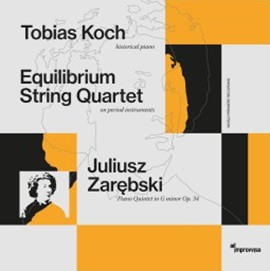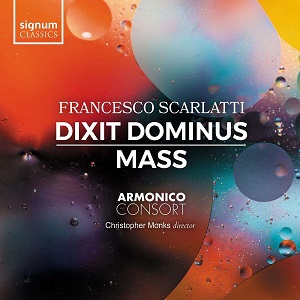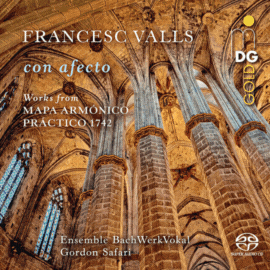Francesco Scarlatti lebt posthum im Schatten seines berühmteren Bruders Alessandro Scarlatti. Auf dem Kontinent blieb der gebürtige Sizilianer beruflich ohne Fortüne. Er versuchte sein Glück jenseits des Ärmelkanals und wurde im britischen Musikleben eine anerkannte Persönlichkeit.
Kein Wunder, dass das im englischen Warwick beheimatete Armonico Consort unter der Leitung von Christopher Mons sich mit Hingabe der Musik des jüngeren Scarlatti-Bruders widmet, von dessen Werken nur wenige überliefert sind.
Für diese Produktion hat sich Christopher Mons auf neue Ausgaben des Dixit Domino und der Messe berufen, Ausgaben, die speziell für diese Einspielung veröffentlicht wurden.
Das Dixit Dominus erleben wir als kraftvolle Musik, in der besonders der theatralische Aspekt hervorgehoben wird – etwa an der Stelle, wo es um den Tag des Zorns und das Zerschmettern weltlicher Herrschaft geht.
Trotz der packenden Dramaturgie verliert die Musik selbst nie ihren natürlichen Fluss, sie atmet und lebt von innen heraus.
Sängerisch überzeugen vor allem die Damenstimmen, die sich in wunderbarem Einklang mit dem Instrumentalensemble bewegen.
Von der Missa a 16 voci gibt es nur das Kyrie und das Credo. Auch diese unvollständige Partitur interpretiert Armonico Consort mit dramatischer Wucht, viel Liebe zum Detail und mit innerer Spannung, die ihren logischen Höhepunkt im finalen Quoniam-Satz erreicht.
Francesco Scarlatti lived posthumously in the shadow of his more famous brother Alessandro Scarlatti. On the continent, the native Sicilian remained professionally without fortune. He tried his luck on the other side of the English Channel and became a recognized personality in British musical life.
No wonder that the Warwick, England-based Armonico Consort, conducted by Christopher Mons, is devoted to the music of the younger Scarlatti brother, of whose works only a few have survived.
For this production, Christopher Mons has drawn on new editions of the Dixit Domino and the Mass, editions published specifically for this recording.
We experience the Dixit Dominus as powerful music in which the theatrical aspect is particularly emphasized – for example, at the point where it deals with the Day of Wrath and the shattering of worldly rule.
Despite the gripping dramaturgy, the music itself never loses its natural flow; it breathes and lives from within.
Vocally, the ladies’ voices are especially convincing, moving in wonderful harmony with the instrumental ensemble.
Of the Missa a 16 voci, there are only the Kyrie and the Credo. Armonico Consort also interprets this incomplete score with dramatic force, much attention to detail and with inner tension that reaches its logical climax in the final Quoniam movement.























